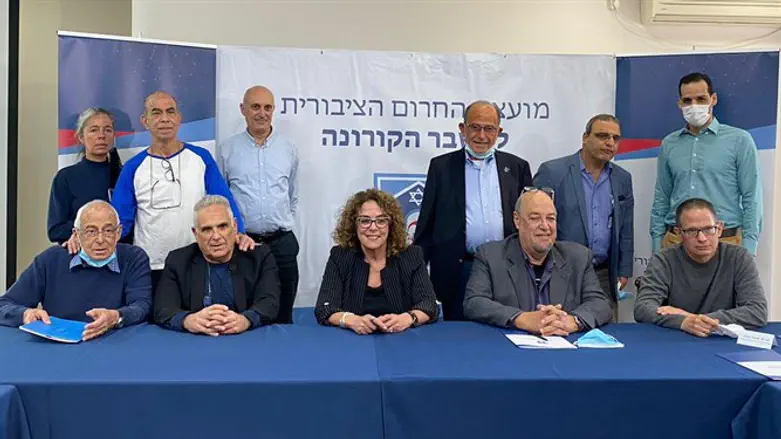
Senior scientists from the Public Emergency Council for the Coronavirus Crisis today addressed an urgent request to their colleagues at the Weizmann Institute and Hebrew University that they share and publish the models according to which decisions are made to manage the COVID-19 crisis, reports Channel 12 News.
According to the senior physicians, who include a Nobel Laureate, "the desire is to have an in-depth and transparent dialogue among colleagues."
In their request, the physicians emphasized the model of Prof. Eran Segal regarding the British mutation, which convinced the decision-makers to tighten the lockdown and close the education system completely. They question Prof. Segal's skill in building models in this area.
Segal heads the Weizmann Institute of Science Department of Computer Science and Applied Mathematics, and the Weizmann Institute Department of Molecular Cell Biology. He received NIS 350,000 from the Israel Science Foundation to build a system for predicting areas of coronavirus infection through a national survey by anonymous questionnaire spanning one year.
The experts also wrote that "as we have learned from past crisis events, including the Yom Kippur War, professional pluralism is critical and can only be made possible with transparency. All we want is to have an in-depth and transparent peer dialogue, believing that all those involved put the good of the citizens of the State of Israel before any other consideration."
The Public Emergency Council for the Coronavirus Crisis includes Nobel Laureate biologist Prof. Aaron Ciechanover, who won the Nobel prize in Chemistry for characterizing the method that cells use to degrade and recycle proteins using ubiquitin, Pioneer of AIDS Medicine in Israel Prof. Zvi Bentoitch, Hebrew University Family Medicine Department and School of Medicine Head Prof. Amnon Lahad, and Former School of Medicine Dean and Ben Gurion University President Prof. Rivka Carmi.
They call for sharing all raw data, models, calculation and analysis methods, sources, and partners in the development of these models for peer review, as customary in the scientific community.
With the commencement of the third lockdown the same group of professors and doctors presented to ministers and Knesset Members a situation analysis seeking to show that the medical establishment's method of managing the crisis does not reflect the situation on the ground, and some of their conclusions are far from reality.
Council Members include:
- Former IDF Chief Medical Officer and Medical Association Ethics Committee Chairman Brigadier General (Res.) Prof. Eran Dolev.
- Former Health Ministry Director and Sheba Medical Center Director Prof. Mordechai (Motke) Shani.
- AIDS medicine in Israel pioneer and Tropical Diseases and AIDS Center at Ben-Gurion University head Prof. Zvi Bentoitch.
- Former School of Medicine Dean and Ben Gurion University President Prof. Rivka Carmi.
- Israel Prize laureate post-trauma expert Prof. Zehava Solomon.
- Former Health Ministry Geriatrics Division Institutional Services head, Dignity and Patients' Rights Committee Chairman, and National Council for Geriatrics member Prof. Yaakov Gindin.
- Infectious diseases in children specialist and Sourasky Medical Center in Tel Aviv Microbiological Laboratory Director Prof. Amos Adler.
- Hebrew University Family Medicine Department and School of Medicine Head Prof. Amnon Lahad.
- Tel Hashomer Hospital oncogenetic unit and clinic for high-risk women founder and former Health Ministry Supreme Helsinki Committee Chairman Prof. Eitan Friedman.
- Professor of Social Work, former President of the Achva Academic College, and Ben Gurion University School of Social Work head Prof. Elian Alkrinawi.
- Former English Hospital in Nazareth Director and Society for the Promotion of the Health of the Arab Population in Israel Chairman Prof. Elian Alkrinawi.
- Former Meir Hospital Director and United Health Insurance Fund CEO Prof. Asher Elhiani.
